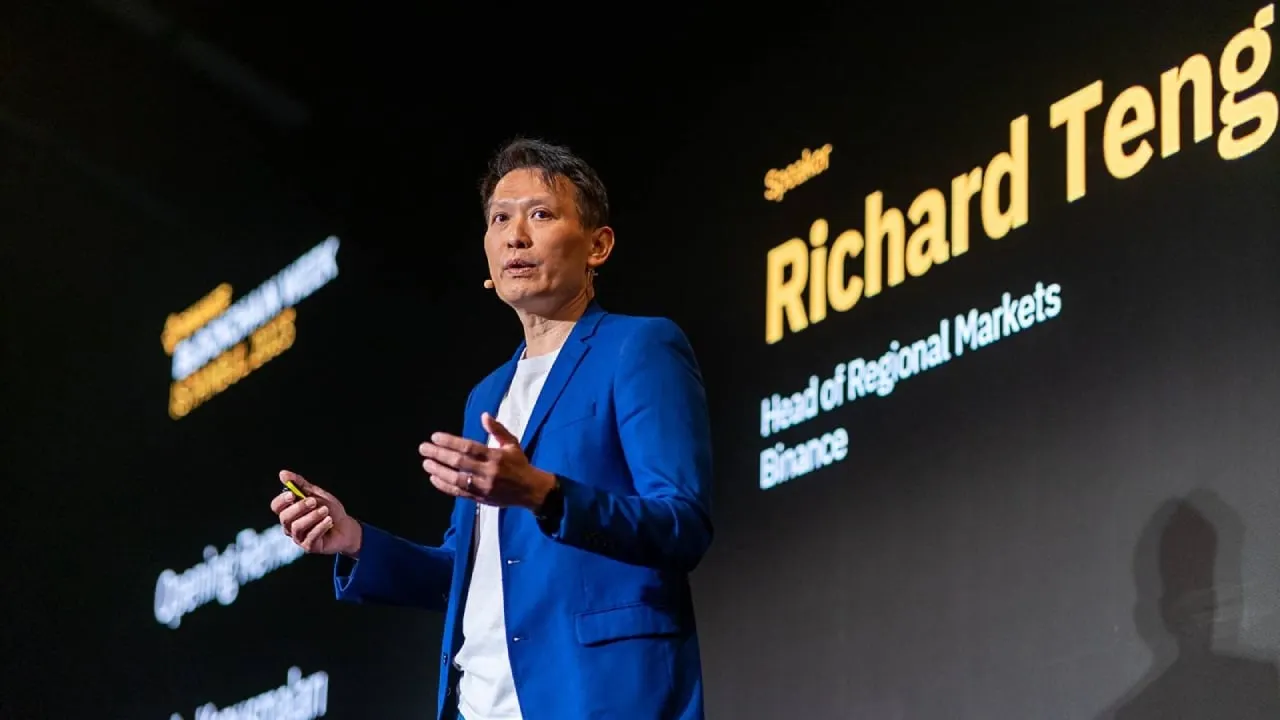Binance CEO Denies Exchange Froze All Palestinian Customer Funds

Binance's CEO Richard Teng dismissed claims that the crypto exchange has helped Israel seize assets from swaths of Palestinian users.
Binance CEO Richard Teng dismissed allegations of widespread asset seizures targeting Palestinian users Wednesday, stating that the crypto exchange has only clamped down on accounts in the region at the behest of Israeli armed forces under specific circumstances.
“Only a limited number of user accounts, linked to illicit funds, were blocked from transacting,” Teng said on Twitter (aka X). “As a global crypto exchange, we comply with internationally accepted anti-money laundering legislation.”
On Monday, Ray Youssef, the CEO of Noones, a peer-to-peer Bitcoin marketplace, asserted that Binance “has seized all funds from all Palestinians” at the request of Israeli armed forces. In a series of Twitter posts, he presented Noones as an alternative service for people “boycotting Binance,” alongside several pieces of evidence that purportedly supported his claims.
On Twitter, Youssef posted a letter written in Hebrew dated November 2023. In the letter, which isn’t specifically addressed to anyone, Paul Landes, who leads Israel's National Bureau for Counter Terror Financing, stated that “cryptocurrency wallets, including those registered in your name, were used to transfer funds from the declared terrorist organization Hamas.”
While the document's authenticity couldn’t immediately be confirmed by Decrypt, the letter appeared to be directed at a specific individual or entity. It also referenced a “Seizure Order,” which wasn’t included alongside Youssef’s letter.
Youssef’s initial post, which claimed that Binance refuses to “return the funds,” had been viewed over 500,000 times on Twitter, as of this writing. In a follow-up tweet, Youssef said that he “received this from several sources” who have encountered difficulty retrieving their seized funds.
Decrypt reached out to Israeli armed forces seeking clarification regarding the letter’s authenticity and scope, but it did not immediately hear back.
Youssef also presented “video proof” that a blanket seizure of Palestinian users' funds had occurred. In the screen recording, which appears to be from an iPhone, Noones is shown as a frequently visited website, and the phone has an app for the pizza chain Domino’s installed.
Youssef did not immediately respond to a request for comment from Decrypt.
Since 2021, Israel has seized funds from 190 Binance accounts, Reuters reported in May. Additionally, the Department of Justice (DOJ) said last November that Binance “willfully caused” around $900 million in trades between U.S. users and Iran, a sanctioned jurisdiction.
The DOJ’s statement came as Binance’s founder and former CEO Changpeng Zhao (aka CZ) stepped down as part of a $4 billion settlement. Zhao pleaded guilty to violating criminal U.S. anti-money laundering requirements, for which he is currently serving a 4-month prison sentence.
Binance did not immediately respond to a request for comment from Decrypt.
Before Youssef became the CEO of Noones, the entrepreneur led the Bitcoin peer-to-peer marketplace Paxful. When the platform was abruptly shut down last April, Youssef told Decrypt that the service had gained a notable presence in the Global South.
In Teng’s Tuesday post, he described “some incorrect statements about” asset seizures as “FUD,” using the acronym for fear, uncertainty, and doubt. Teng added that Binance's ultimate hope is for “a lasting peace throughout the region” that’s been roiled for months by conflict.
“We will vote with our money and go elsewhere until you grow some balls,” Youssef commented on Teng’s post. “This whitewashed gibberish will not work and only makes you look worse.”
Edited by Andrew Hayward
Related News
- Meme Coin Airdrops $10,000 Worth of Tokens to Crypto Influencers—Most Instantly Sell
- Telegram-Linked TON Blockchain Down Again as Devs Blame DOGS Meme Coin Surge
- Rate Cuts Won‘t Boost Bitcoin On Their Own, Says Arthur Hayes
- Democratic Congressman Slams SEC's 'Heavy-Handed Approach' Over OpenSea Threats
- Token2049 Closing Event to Showcase Immersive 360° Audio Experience
- Bitcoin Network Stacks Begins Rollout of Speed-Boosting Nakamoto Upgrade
- Brave Browser Lays Off 27 Employees: Report
- Telegram CEO Pavel Durov Moved From Custody to French Court: Report
- OpenSea Expecting SEC Lawsuit Over NFTs Being Securities, Says CEO
- Telegram Game 'Hamster Kombat' Reveals Token Launch, Airdrop in September
© 2025 DeFi.io